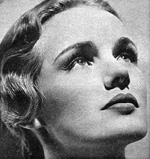
The Return Of An Actress

Few women have crowded into 43 years of living success and such despair as Frances Farmer. And few have returned from so far, so anguishing, a journey.
Fame, for Frances Farmer, came with dizzying speed. At 19, she was a college student in Seattle, Washington; at 23 (above) she was a $200,000-a-year stage and screen star, married to actor Leif Erikson, admired for her talent, beauty, intelligence. Almost as suddenly came the appalling descent into illness and oblivion. From 1942 to 1957 Frances Farmer vanished, with only a passing newspaper item to tell of her years in and out of mental institutions. Today, she says with a sad smile, "I think to myself, 'It never really happened to me. It happened to someone with my name who looks like me.'"
"Very eager to get ahead; full-hearted; sensitive; high-strung; a great beauty." So director Elia Kazan remembers the young Frances Farmer. Actually, she had begun with dreams of being a writer. As a 17-year-old high school student, her essay, "God Dies" had won a nationwide magazine contest. "It was my first conscious questioning of fate," she recalls, "my first doubt that perfect security exists for anyone. I was influenced by Dreiser and O'Neill." But when she won the lead in a University of Washington senior play, writing paled before the drama. Then, a screen test - and Hollywood.
A gnawing, indefinable dissatisfaction was setting in. In "Golden Boy" the hero had torn himself apart choosing between success and art. This, Miss Farmer felt, was her dilemma, too. "For the first time I asked myself, 'Where am I going? Do I want to go there?' I was torn between Hollywood success - and the Group Theatre ideal of art. Meanwhile, even my marriage was beginning to crash. I took myself and the world, and the war pressing in on us then, very seriously." Distraught, obsessed by a sense of inevitable tragedy that haunted her since high school days, she tottered on the edge of breakdown. "I couldn't cope with it. I drank to escape the pressures." Then - the crack-up.
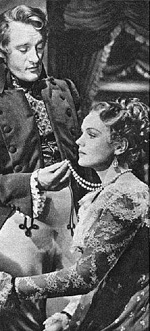
From 1936 to 1942, Miss Farmer appeared in nearly 20 films - as well as several Broadway plays - with such leading men as George Sanders (above from "Son of Fury"), Cary Grant and Tyrone Power.
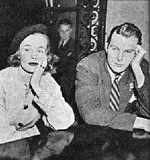
Different interests, differences in temperament led to ultimate divorce from Erikson.
Looking back to 1944-1952, much of it spent in the Washington State Hospital, she asks, "What is emotional illness? What is mental illness? Where does one end, the other begin? I don't know. There was reality then for me, but it was the awful reality of institutions." During those dark years she felt like an exhausted swimmer treading water, "gritting my teeth, hoping I wouldn't go under, that somehow I'd reach shore." In 1952, recovered, she returned to Seattle to care for her ill parents. After they died in 1954, she took one modest job after another. Only by slow stages did she reach the point of accepting an acting role again, at the Bucks County Playhouse last August in "The Chalk Garden" (below). "I had thought that world had ended for me."
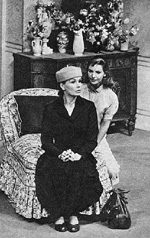
It wasn't easy to dare the limelight again. "Just to resume my life in the world, to walk down the street as a human being, not an institutional number, was a shattering experience..." She was working as a bookkeeper in Eureka, California, when Lee Mikesell, a radio management consultant, encouraged her to think of a comeback. "My first reaction was no. I thought, 'I'm safe here - maybe being a bookkeeper isn't suited to my talents, but there aren't any ups and downs, no tremors and anxieties, no career to tear me in two. Why give this up? And why expose myself to a past which is buried and forgotten?'" Mikesell prevailed upon her; "Once an actress, always an actress. You're never too old, you can never be too long away from the theatre." She said she'd try.
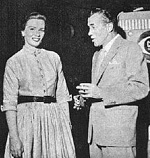
Ed Sullivan (above) gave her big break by having her sing on two TV programs.
It takes time, courage - and great faith in yourself and in fellow human beings - to pick up the pieces of a life you thought had vanished long ago. "You know for a while I grew accustomed to thinking of myself as somebody else," she confesses. "There had been a Frances Farmer, an actress - but she wasn't me. I was another woman working quietly, peacefully, almost devoid of dreams - or hope." But now, as Frances Farmer again, she is back in the work for which she had always prepared herself: she takes singing lessons, studies scripts, consults with agents, producers. "I spent 40 years of my life thinking, being, living, an actress. That's who I am. That's my identity. That's what I shall keep on being. And some day I'd like to be one of the finest actresses on the legitimate stage."
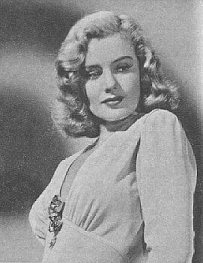
Written by Gerold Frank for Coronet magazine in 1958